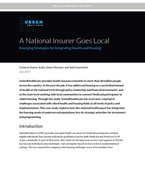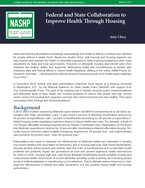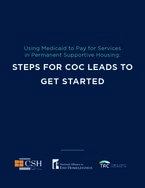0
Video
Community:
Jun 17, 2022
The Vancouver Housing Authority collaborated with a Federally Qualified Health Center and a homeless crisis response system to develop a network of scattered-site and site-based supportive housing. This moderated discussion will cover how VHA paired Housing Choice Vouchers and public housing with a Medicaid-funded supportive housing benefit to serve people identified by the community’s Coordinated Entry as needing supportive housing. Speakers will also discuss the challenges faced through the process, model adjustments made, and evaluation of the work through matching housing data and Medicaid utilization data.
Authored by:
Topics: Advocacy, CLPHA, Data sharing, Family engagement, Health, Healthy homes, Homelessness, Housing, Legislation & Policy, Low-income, Research, Stability, Sustainability
 Shared by Karina George
Shared by Karina George
Karina George posted a
on Jun 17, 2022
The Vancouver Housing Authority collaborated with a Federally Qualified Health Center and a homeless crisis response system to develop a network of scattered-site and site-based supportive housing.
0
Podcast
Community:
Padma Thangaraj, MS, PMP, is the Vice President of Information Services & Analytics at All Chicago Making Homelessness History, a nonprofit organization that is working to integrate housing, health, and human services data to coordinate care for Chicago residents that are experiencing housing insecurity or homelessness. As one of the pilot awardees of DASH CIC-START, All Chicago worked to refine their mechanisms for exchanging data between hospitals, health care payers, and the county’s Homeless Management Information System (HMIS). She joined the podcast to share her lessons learned and advice for others working to improve improve residential stability and health outcomes through the integration of HMIS and other data.
Authored by: All In: Data for Community Health
Topics: Data sharing, Health, Homelessness, Housing, Midwest
 Shared by Housing Is
Shared by Housing Is
Housing Is posted a
on May 2, 2019
All In: Data for Community Health
Padma Thangaraj, MS, PMP, is the Vice President of Information Services & Analytics at All Chicago Making Homelessness History, a nonprofit organization that is working to integrate housing, health, and human services data to coordinate care for Chicago residents that are experiencing housing in
0
Interactive
Community:
The Legal Bibliography is collection of 100+ papers, toolkits and other materials focused on privacy, consent and policy documentation. Co-developed by the Network for Public Health Law and Data Across Sectors for Health (DASH), the Bibliography is a growing resource for lawyers and community data practitioners, intended to support local collaboratives in their efforts to share data across sectors.
Authored by: Data Across Sectors for Health (DASH) and Network for Public Health Law (NPHL)
Topics: Criminal justice, Data sharing, Education, Health, Homelessness, Housing, Mental health, Partnerships, Safety
 Shared by Housing Is
Shared by Housing Is
Housing Is posted a
on Apr 8, 2019
Data Across Sectors for Health (DASH) and Network for Public Health Law (NPHL)
The Legal Bibliography is collection of 100+ papers, toolkits and other materials focused on privacy, consent and policy documentation.
0
Publication
Community:
Mar 1, 2019
CSH selected the Center for Data Science and Public Policy (DSaPP) at the University of Chicago to develop a web-based data integration tool, which was completed in 2018. The tool connects county jail administrative data from the justice system to homeless system data, through communities’ Homeless Management Information Systems (HMIS).
Authored by: CSH
Topics: Criminal justice, Data sharing, Homelessness, Housing, Midwest, Partnerships, Supportive housing
 Shared by Housing Is
Shared by Housing Is
Housing Is posted a
on Apr 4, 2019
CSH selected the Center for Data Science and Public Policy (DSaPP) at the University of Chicago to develop a web-based data integration tool, which was completed in 2018.
0
Publication
Community:
Mar 20, 2019
To equip municipalities with the skills and tools to address these challenges, New York State created the $12 million Cities for Responsible Investment and Strategic Enforcement (Cities RISE) program, which provides leadership, management, and technical support to help 16 municipalities address deteriorating homes, vacant properties, and neighborhood decline through strategic code enforcement. Cities RISE uses code enforcement strategies to advance broader community development goals, and, in doing so, helps municipalities align programs aimed at improving residents’ quality of life.
Authored by: Aaron Shroyer How Housing Matters (The Urban Institute)
Topics: Community development, Data sharing, Homelessness, Housing, Legislation & Policy, Partnerships
 Shared by Housing Is
Shared by Housing Is
Housing Is posted a
on Mar 26, 2019
Aaron Shroyer How Housing Matters (The Urban Institute)
To equip municipalities with the skills and tools to address these challenges, New York State created the $12 million Cities for Responsible Investment and Strategic Enforcement (Cities RISE) program, which provides leadership, management, and technical support to help 16 municipalities address dete
0
Case study
Community:
This is a summary of HealthInfoNet’s (HIN) recommendations to pursue the integration of Maine’s Homeless Information Management System (HMIS) with Maine’s statewide Health
Information Exchange (HIE).
Authored by: HealthInfoNet and Data Across Sectors for Health (DASH)
Topics: Data sharing, East Coast, Health, Homelessness, Housing, Partnerships
 Shared by Mica O'Brien
Shared by Mica O'Brien
Mica O'Brien posted a
on Feb 20, 2019
HealthInfoNet and Data Across Sectors for Health (DASH)
This is a summary of HealthInfoNet’s (HIN) recommendations to pursue the integration of Maine’s Homeless Information Management System (HMIS) with Maine’s statewide Health
Information Exchange (HIE).
0
Policy Brief
Community:
This annotated resource compilation is intended to help state and local agencies access information and resources needed to better understand the federal legal protections and requirements associated with datasets collected by federal agencies or as part of a federally funded program.
Authored by: The Network for Public Health Law
Topics: Data sharing, Disabilities, Early childhood, Education, Health, Homelessness, Legislation & Policy, Post-secondary
 Shared by Mica O'Brien
Shared by Mica O'Brien
Mica O'Brien posted a
on Feb 20, 2019
The Network for Public Health Law
This annotated resource compilation is intended to help state and local agencies access information and resources needed to better understand the federal legal protections and requirements associated with datasets collected by federal agencies or as part of a federally funded program.
0
Report
Community:
Mar 14, 2018
There were 33,889 homeless schoolchildren in Florida during the 2007–08 school year, including children temporarily doubled up with others and children staying in hotels, motels, shelters, transitional housing, and unsheltered locations. By the 2015–16 school year, that number had risen to 72,601. This report suggests that the rise is because of the recession and foreclosure crisis, the state’s increasing shortage of affordable housing, and school districts training teachers, counselors, and other staff to identify students with no permanent housing.
Authored by: The Shimberg Center for Housing Studies and Miami Homes for All
Topics: Data sharing, Education, Homelessness, Housing, Low-income, Research, South, Stability, Youth
 Shared by Mica O'Brien
Shared by Mica O'Brien
Mica O'Brien posted a
on Nov 21, 2018
The Shimberg Center for Housing Studies and Miami Homes for All
There were 33,889 homeless schoolchildren in Florida during the 2007–08 school year, including children temporarily doubled up with others and children staying in hotels, motels, shelters, transitional housing, and unsheltered locations. By the 2015–16 school year, that number had risen to 72,601.
0
Policy Brief
Community:
Oct 29, 2018
In this Focus on Unaccompanied Youth brief, we review data and information that help us answer the following
questions:
• What is the scale of youth homelessness?
• What do we know about unaccompanied youth who experience homelessness?
• What do we know about patterns of homelessness among unaccompanied youth?
• What do we know about youths’ risks for experiencing homelessness?
• What are the most significant gaps in available data and our current understanding of unaccompanied
youth who experience homelessness?
Authored by: U.S. Interagency Council on Homelessness
Topics: Data sharing, Homelessness, Housing, Low-income, Metrics, Research, Youth
 Shared by Mica O'Brien
Shared by Mica O'Brien
Mica O'Brien posted a
on Nov 1, 2018
U.S. Interagency Council on Homelessness
In this Focus on Unaccompanied Youth brief, we review data and information that help us answer the following
questions:
• What is the scale of youth homelessness?
• What do we know about unaccompanied youth who experience homelessness?
• What do we know about patterns of homelessness among unacc
0
Report
Community:
Oct 24, 2018
CLPHA’s Housing Is Initiative is engaged in a number of cross-sector activities focused on developing partnerships, facilitating a community of practice, resource development, promoting best practices, online collaboration, policy and advocacy, and training and education. Read about recent activities in this Fall Update.
Authored by:
Topics: Child welfare, CLPHA, Community development, Cost effectiveness, Data sharing, Early childhood, Education, Family engagement, Funding, Health, Homelessness, Housing, Low-income, Medicaid / Medicare, Mental health, Partnerships, Place-based, Post-secondary, Research, Stability, Substance abuse, Workforce development, Youth
 Shared by Mica O'Brien
Shared by Mica O'Brien
Mica O'Brien posted a
on Oct 24, 2018
CLPHA’s Housing Is Initiative is engaged in a number of cross-sector activities focused on developing partnerships, facilitating a community of practice, resource development, promoting best practices, online collaboration, policy and advocacy, and training and education.
0
Report
Community:
Aug 9, 2018
UnitedHealthcare provides health insurance benefits to more than 40 million people across the country. In the past decade, it has addressed housing as a social determinant of health at the national level through policy leadership and financial investments, and at the state level working with local communities to connect Medicaid participants to stable housing. Through this work, UnitedHealthcare has overcome a myriad of challenges associated with siloed health and housing fields at all levels of policy and implementation. This case study explores how this national health payer has integrated the housing needs of underserved populations into its strategic priorities for investment and programming.
Authored by:
Topics: Affordable Care Act, Data sharing, Funding, Health, Homelessness, Housing, Low-income, Medicaid / Medicare, Partnerships
 Shared by Housing Is
Shared by Housing Is
Housing Is posted a
on Aug 9, 2018
UnitedHealthcare provides health insurance benefits to more than 40 million people across the country.
0
Research
Community:
Aug 1, 2018
We sought to learn more about how state- and locally funded rental
assistance programs were created, how they are structured, whom they serve, and how they are funded.
Authored by:
Topics: Cost effectiveness, Data sharing, Disabilities, Family engagement, Funding, Health, Homelessness, Housing, Legislation & Policy, Low-income, Partnerships, Research, Supportive housing
 Shared by Housing Is
Shared by Housing Is
Housing Is posted a
on Aug 1, 2018
We sought to learn more about how state- and locally funded rental
assistance programs were created, how they are structured, whom they serve, and how they are funded.
0
Report
Community:
Jul 19, 2018
In December 2016, federal and state policymakers examined health and housing issues at a meeting convened in Washington, D.C., by the National Academy for State Health Policy (NASHP) with support from The Commonwealth Fund. The goal of the meeting was to identify concrete policy recommendations and actionable steps to align health and housing programs to ensure that people with high service needs receive the housing and supportive services they need to become and stay healthy. This report summarizes their findings and recommendations
Authored by:
Topics: Data sharing, Disabilities, Health, Homelessness, Legislation & Policy, Low-income, Medicaid / Medicare, Partnerships, Supportive housing
 Shared by Housing Is
Shared by Housing Is
Housing Is posted a
on Jul 19, 2018
In December 2016, federal and state policymakers examined health and housing issues at a meeting convened in Washington, D.C., by the National Academy for State Health Policy (NASHP) with support from The Commonwealth Fund.
0
Publication
Community:
Jul 13, 2018
This guide is organized around five steps, each of which includes concrete ways to get started as well as links to additional resources. These five steps will help you build a case for why and how Medicaid can be structured at the state and local levels to pay for services in permanent supportive housing. When building a case you need to know some basics of Medicaid and the types of services you want Medicaid to cover. in order to convince Medicaid administrators and other health care payers to support your efforts, you need to have evidence of need for and impact of supportive housing and you need a coalition of many stakeholders at your side.
Authored by:
Topics: Affordable Care Act, Data sharing, Funding, Health, Homelessness, Medicaid / Medicare, Partnerships, Supportive housing
 Shared by Housing Is
Shared by Housing Is
Housing Is posted a
on Jul 13, 2018
This guide is organized around five steps, each of which includes concrete ways to get started as well as links to additional resources.
0
Publication
Community:
Jul 13, 2018
Recognizing the layers to developing a health and housing partnership, this Literature Review and Resource Bank is intended to provide background and data resources that can be used in grant applications or in conversations with potential funders in the effort to foster new health and supportive housing partnerships.
Authored by:
Topics: Cost effectiveness, Criminal justice, Data sharing, Dual-eligibles, Funding, Health, Homelessness, Housing, Low-income, Medicaid / Medicare, Mental health, Partnerships, Post-secondary, Preventative care, Research, Seniors, Substance abuse, Supportive housing, Youth
 Shared by Housing Is
Shared by Housing Is
Housing Is posted a
on Jul 13, 2018
Recognizing the layers to developing a health and housing partnership, this Literature Review and Resource Bank is intended to provide background and data resources that can be used in grant applications or in conversations with potential funders in the effort to foster new health and supportive hou
0
Publication
Community:
Jul 12, 2018
This brief aims to bring attention to non-Medicaid funding sources that states could potentially blend or braid to address social determinants of health and other needs that are not typically covered by Medicaid. It is intended to familiarize state Medicaid, public health, and other state policymakers with the funding streams of other agencies, and sketch out a continuum of options to help states coordinate funding to better serve the needs of low-income populations. Because this brief focuses on services for adult Medicaid beneficiaries, it does not address many of the funding sources available for children’s services. However, existing efforts to pool funds for children and youth—notably by the Commonwealth of Virginia—could prove instructive for states seeking to launch such an effort for adults.
Authored by:
Topics: Cost effectiveness, Data sharing, Dual-eligibles, Food insecurity, Funding, Health, Homelessness, Housing, Legislation & Policy, Low-income, Medicaid / Medicare, Mental health, Partnerships, Research, Substance abuse
 Shared by Housing Is
Shared by Housing Is
Housing Is posted a
on Jul 12, 2018
This brief aims to bring attention to non-Medicaid funding sources that states could potentially blend or braid to address social determinants of health and other needs that are not typically covered by Medicaid.
0
Research
Community:
Jul 11, 2018
A Research Review and Comment on Future Directions for Integrating Housing and Health Services
Authored by:
Topics: Affordable Care Act, Cost effectiveness, Data sharing, Exercise, Health, Homelessness, Housing, Low-income, Medicaid / Medicare, Mental health, Metrics, Nutrition, Obesity, Partnerships, Preventative care, Research, Supportive housing
 Shared by Housing Is
Shared by Housing Is
Housing Is posted a
on Jul 11, 2018
A Research Review and Comment on Future Directions for Integrating Housing and Health Services
0
Policy Brief
Community:
Jul 10, 2018
This brief explores how state Medicaid agencies have utilized a variety of federal authorities and delivery systems to increase access to supportive housing services and highlights important implementation considerations.
Authored by:
Topics: Cost effectiveness, Criminal justice, Data sharing, Funding, Health, Healthy homes, Homelessness, Housing, Legislation & Policy, Low-income, Medicaid / Medicare, Mental health, Partnerships, Substance abuse, Supportive housing
 Shared by Housing Is
Shared by Housing Is
Housing Is posted a
on Jul 10, 2018
This brief explores how state Medicaid agencies have utilized a variety of federal authorities and delivery systems to increase access to supportive housing services and highlights important implementation considerations.
0
Report
Community:
Jul 10, 2018
In December 2016, federal and state policymakers examined the intersection of unstable housing and negative health outcomes at a meeting convened in Washington, D.C., by the National Academy for State Health Policy (NASHP) with support from The Commonwealth Fund. The goal of the meeting was to identify concrete policy recommendations and actionable steps to align health and housing programs to ensure that people with high service needs receive the housing and supportive services they need to become and stay healthy. This report summarizes their findings and recommendations.
Authored by:
Topics: Child welfare, Cost effectiveness, Data sharing, Disabilities, Dual-generation, Health, Homelessness, Housing, Legislation & Policy, Low-income, Medicaid / Medicare, Partnerships, Seniors, Supportive housing
 Shared by Housing Is
Shared by Housing Is
Housing Is posted a
on Jul 10, 2018
In December 2016, federal and state policymakers examined the intersection of unstable housing and negative health outcomes at a meeting convened in Washington, D.C., by the National Academy for State Health Policy (NASHP) with support from The Commonwealth Fund.
0
Publication
Community:
Jul 10, 2018
Working Together to Meet Unmet Housing and Healthcare Needs
Authored by:
Topics: Affordable Care Act, Data sharing, Health, Homelessness, Housing, Low-income, Medicaid / Medicare, Mental health, Partnerships, Stability, Substance abuse, Supportive housing
 Shared by Housing Is
Shared by Housing Is
Housing Is posted a
on Jul 10, 2018
Working Together to Meet Unmet Housing and Healthcare Needs
0
News Article
Community:
Aug 1, 2016
Boulder County, Colo., pioneered the movement. What can others learn from their experience?
Authored by: Mattie Quinn for Governing the State and Localities
Topics: Cost effectiveness, Data sharing, Dual-eligibles, Food insecurity, Health, Homelessness, Housing, Legislation & Policy, Low-income, Medicaid / Medicare, Partnerships, Place-based, Supportive housing, West Coast
 Shared by Housing Is
Shared by Housing Is
Housing Is posted a
on Jul 5, 2018
Mattie Quinn for Governing the State and Localities
Boulder County, Colo., pioneered the movement. What can others learn from their experience?
0
Webinar
Community:
Feb 21, 2018
Presentation from CLPHA's February 2018 Health Strategic Planning Workshop, co-facilitated with Health Impact Project and Grantmakers in Health
Authored by: CLPHA, Health Impact Project (Pew/RWJF), and Grantmakers in Health
Topics: Affordable Care Act, CLPHA, Community development, Data sharing, Health, Healthy homes, Homelessness, Housing, Medicaid / Medicare, Mental health, Obesity, Partnerships, Place-based, Research, Supportive housing, TA
 Shared by Steve Lucas
Shared by Steve Lucas
Steve Lucas posted a
on Feb 27, 2018
The 2018 CLPHA Health Strategic Planning Workshop, co-facilitated with Health Impact Project (a collaboration of Pew Charitable Trusts and Robert Wood Johnson Foundation) and Grantmakers in Health, convened over 35 communities across the country. Participating teams included internal PHA staff at member agencies who work on health-related initiatives as well as external partners that provide services, education, and other health resources for residents.
CLPHA, Health Impact Project (Pew/RWJF), and Grantmakers in Health
Presentation from CLPHA's February 2018 Health Strategic Planning Workshop, co-facilitated with Health Impact Project and Grantmakers in Health
 Shared by Karina George
on Jun 17, 2022
Shared by Karina George
on Jun 17, 2022
 Shared by Housing Is
on May 2, 2019
Shared by Housing Is
on May 2, 2019
 Shared by Housing Is
on Apr 8, 2019
Shared by Housing Is
on Apr 8, 2019
 Shared by Housing Is
on Apr 4, 2019
Shared by Housing Is
on Apr 4, 2019
 Shared by Housing Is
on Mar 26, 2019
Shared by Housing Is
on Mar 26, 2019
 Shared by Housing Is
on Aug 9, 2018
Shared by Housing Is
on Aug 9, 2018
 Shared by Housing Is
on Aug 1, 2018
Shared by Housing Is
on Aug 1, 2018
 Shared by Housing Is
on Jul 19, 2018
Shared by Housing Is
on Jul 19, 2018
 Shared by Housing Is
on Jul 13, 2018
Shared by Housing Is
on Jul 13, 2018
 Shared by Housing Is
on Jul 13, 2018
Shared by Housing Is
on Jul 13, 2018
 Shared by Housing Is
on Jul 12, 2018
Shared by Housing Is
on Jul 12, 2018
 Shared by Housing Is
on Jul 11, 2018
Shared by Housing Is
on Jul 11, 2018
 Shared by Housing Is
on Jul 10, 2018
Shared by Housing Is
on Jul 10, 2018
 Shared by Housing Is
on Jul 10, 2018
Shared by Housing Is
on Jul 10, 2018
 Shared by Housing Is
on Jul 10, 2018
Shared by Housing Is
on Jul 10, 2018
 Shared by Housing Is
on Jul 5, 2018
Shared by Housing Is
on Jul 5, 2018
 Shared by Steve Lucas
on Feb 27, 2018
Shared by Steve Lucas
on Feb 27, 2018















